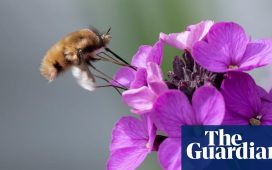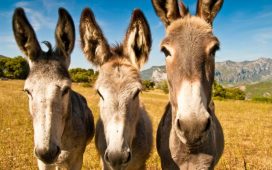It is being billed as the long-awaited breakthrough moment in European gastronomy for mealworm burgers, locust aperitifs and cricket granola.
In the next few weeks the EU’s European Food Safety Authority is expected by the insect industry to endorse mealworms, lesser mealworms, locusts, baby crickets and adult crickets as being safe for human consumption.
It is likely to lead to the final authorisation of their sale across the EU as a “novel food” by as soon as the autumn, opening up opportunities for mass production of a range of insect dishes to be sold across Europe for the first time.
“These have a good chance of being given the green light in the coming few weeks,” said Christophe Derrien, the secretary general of the industry organisation International Platform of Insects for Food and Feed. “We reckon these authorisations will be a breakthrough for the sector so we are looking for those authorisations quite impatiently. They are taking the necessary time, they are very demanding on information which is not bad. But we believe that once we have the first novel food given a green light from EFSA that will have a snowball effect.”
In the eyes of leading players in the insects-as-food industry, the potential for their high-protein delicacies has been held back by a lack of EU-wide approval.
The UK, the Netherlands, Belgium, Denmark and Finland have taken a permissive approach to a 1997 EU law that requires foods not eaten before that year to get novel food authorisation.
Those national regulators decided the EU law did not pertain to animals used for food. As a result, a host of insect-based products can be found in British, Dutch, Belgian and Finnish supermarkets. About 500 tonnes of insect-based food for human consumption is produced every year.
But such products are banned in France, Italy and Spain, among other countries. In 2018, a new EU law sought to bring some clarity. It stipulated that insect-based dishes would also require novel food authorisation.
A transition period was established to allow companies already producing food from insects to operate until they received a judgment on the safety of the species they work with and final approval by the EU’s institutions.
Indeed, companies such such as Protifarm in the Netherlands, Micronutris in France, Essento in Switzerland and Entogourmet in Spain are said to be preparing to ramp up their operations.
“We have many of our members building bigger factories because the key to success is to upscale your companies and produce on a mass scale. And this is already happening,” Derrien said. “We are expecting the next few years will be very interesting ones and obviously the novel food authorisations will definitely help.”
He added: “The sort of foods ranges from whole insects as an aperitif or as snacks to processed insects in bars or pasta or burgers made out of insects. We believe that insects for food is one solution for some of the biggest challenges we are facing on the planet. In the context of scarce resources, and insect production is not too demanding, you have the capacity to produce high-quality protein. That is a very promising solution.”






